|
Through the Wine-growing Region to the Atlantic Ocean
A Longer Trek at Last
Mossel Bay was the last stop on the coast. From there, I wanted to move on to the legendary Road 62, the longest wine route in the world, as local sources claim. I would not cycle through it all, my dilapidated liver would not endure that. And of course, there would be no tasting when cycling, to avoid unnecessarily prolonging my route due to the swaying movement, or even shortening my life under the wheels of a truck in consequence of my collisional behavior.
In the morning, I heard a strong and persistent wind. While I was in the town, I was not yet aware of its full force because the steep climb was shielding the wind from me. Only on the N2, which was no longer a highway, I realized that the wind was persistently pushing me from behind. It went like clockwork, the steeper hills were only towards the end and so I cycled like a dream. The idyll was disturbed only by frequent road works, where road workers were laying a new surface. The traffic on these 6- to 10- km long sections converged into one very narrow lane. They did not wait until I had passed, but coolly let the cars drive from the opposite direction. So I had to move over and mostly cycled on the repaired road lane which was inaccessible to car traffic. There were quite critical moments when, on a steep descent, I had to dodge among the workers laying down the new surface. But I behaved responsibly, braked and stopped when necessary, so nothing happened. I just kept saying to myself that in the U.S. they would not have let me on to the road at all and would have given me a ride in a police car.
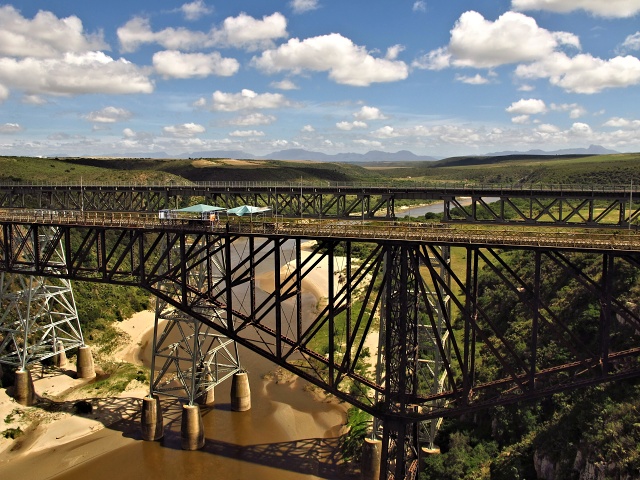
[Gouritz River] Bridge across the Gouritz River; bungee jumping is operated in the middle of the nearer bridge
Riversdale
A neat, clean town with an extremely high quality camp. They had several accommodation alternatives, from a simple camping area without electricity to comfortable furnished cottages. I chose the type with a private bathroom and toilet. I got the keys, pitched the tent on the beautiful lawn, locked the bags in the bathroom and went into the town to buy food. I was enjoying the benefits of a civilized country. I carried no food except for fruit and vegetables and bought only what I needed for lunch-dinner (or a postponed brunch) and for breakfast.
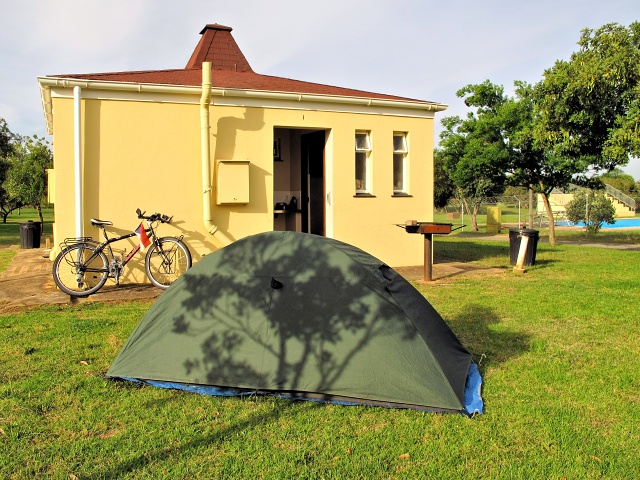
[Riversdale] Takkieskloof camp – as clean and neat as the whole town – I had a lockable bathroom and toilet, in the right background is the swimming pool
And consider everything I got done. I washed my sweaty clothes, cleaned the chain with WD, lubricated and checked the bike, ate my fill, swam several lengths of the 25-meter swimming pool which was part of the camp, and even took a two-hour evening stroll around town. I walked exclusively barefoot in the camp, it was great on the lawn. Try to remember the last time you walked barefoot outdoors.
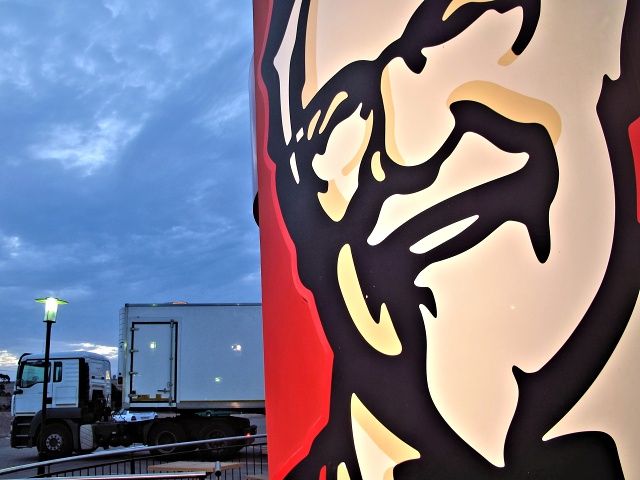
[Riversdale] Evening photo from the N2 road
Upside Down
The landscape dramatically curved, so that cycling on the flat became almost impossible. The road simply led either up or down. It always surprised me how I suffered during the first half-hour of the morning on the hills. My body had processed a hearty breakfast, and so pedaling was of secondary importance. But then later, it started to function automatically.
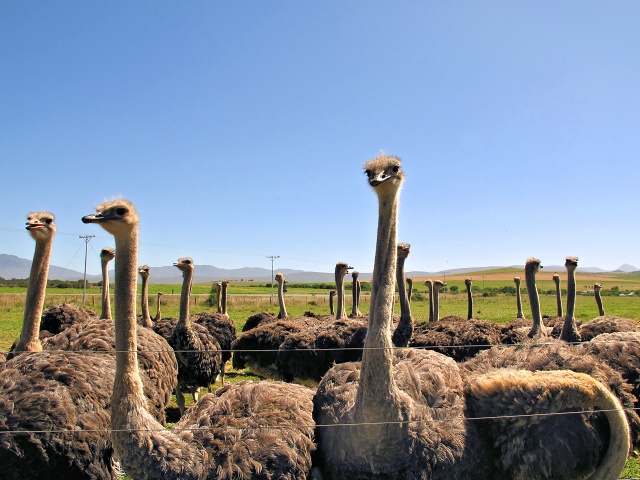
[Near Heidelbeerg] Ostriches stare as if they have never seen a bicycle before
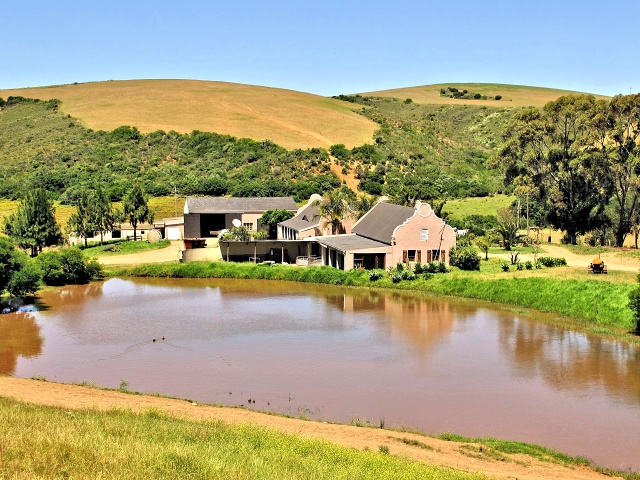
[Near Heidelbeerg] 140-year-old farmhouse, uncharacteristically not whitewashed
Passes
I cycled only 30 km to Heidelberg on the national N2, then turned on to the regional R322 which was a dirt road for 20 km, but still quite good. There was almost no traffic, so I could admire the rich farmlands, seeing farms 130 to 140 years old. It was a special stomp uphill via Moodies Pass to an altitude of 377 meters. I considered it as a preparation for the main attraction, the famous Tradouw Pass. The ascent to the pass was on a paved road, narrow, but with a very good surface. The surrounding area was beautiful, the Tradouw River cutting into the rocks, so the sign 'Tradouw Pass' caught me by surprise. According to the map, the pass should be at an altitude of 400 meters, the sign indicated 357 meters which added up. The first pass on the dirt road had been a bit higher.

[Tradouw Pass] The Tradouw River cuts through the rocks
I stayed in the small village of Barrydale. There was no campsite. I went to the guesthouse and for a reasonable 250 Rands was given an apartment with fully equipped kitchen, large bedroom and accessories. The owner was an elderly couple who were very pleased with me. They wanted to show the facility to me first, but I told them that, just by looking at them, I was sure it would be perfect. And indeed it was. A kitchen equipped with plenty of utensils, microwave, oven, fridge, electric kettle. I had to take advantage of it. In the local store, I bought a piece of sirloin, fish, eggs, potatoes and onions. I baked sliced potatoes in the oven, boiled eggs, prepared a salad, plus the fair hunk of sirloin and fillet of fish. I stuffed my belly, after which no hunger pangs occurred for a single instant until morning.
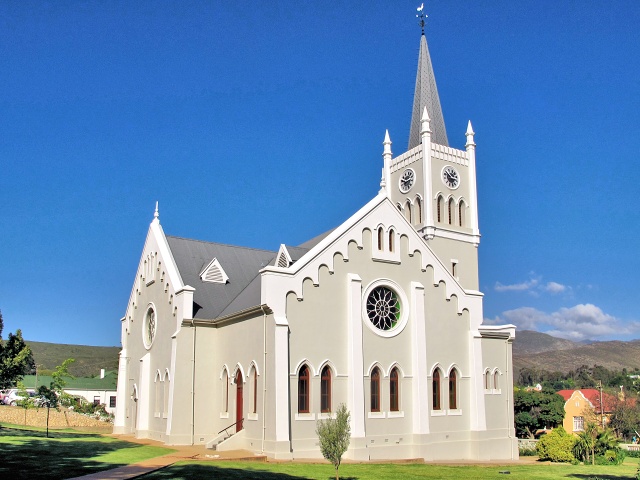
[Barrydale] The landmark of the settlement is the palatial Evangelical Church
Hurray for Booze!
It was Friday afternoon, and the area around the two local liquor stores resembled a beehive, except that the bees were black. Thanks to the regulated sale of alcohol on Saturdays and the ban on Sundays, people have to stock up on supplies so as not to be dry for a single picosecond. The happier buy five-liter boxes of the cheapest wine. Those currently broke try to soften the salesman to give them credit. Begging, which is at other times so popular, has no chance on Fridays. The whites avoid the liquor stores and the blacks do not bother other blacks. So it goes.
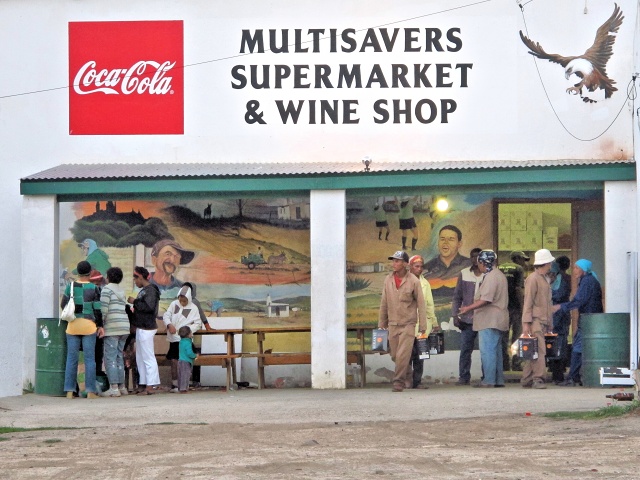
[Barrydale] Due to the ban on weekend alcohol sales, it is vital to buy as much booze as possible on a Friday, even if the children have to eat grass
It should be added that the situation in the cities is more favorable. On Saturday after 5 p.m. the liquor stores in Robertson were still open in the large shopping malls. But on Sundays, everything was definitely closed everywhere.
A Joy to Behold
The landscape here was really a joy. The lush green, framed by a wreath of mountains made me oblivious of the vertically variable terrain, which placed increased demands on the physical condition of a cyclist. What I really did not understand was the marking of passes on the map of the Western Cape produced locally (a free map). Tradouw Pass was marked both on the map and on the road, even though it was a quite relaxing climb up to 357 meters. However, after Barrydale there was a steep section where I had to stomp on the pedals up to an altitude of more than 700 meters, but there was not a dot on the map. Conversely, Kogmanskloof Pass, advertised on the map beyond Montagu, was almost flat. But it is true that the passes marked on the map were always very picturesque.

[20 km west of Montagu] Wide verge, good surface, hills, ideal cycling conditions
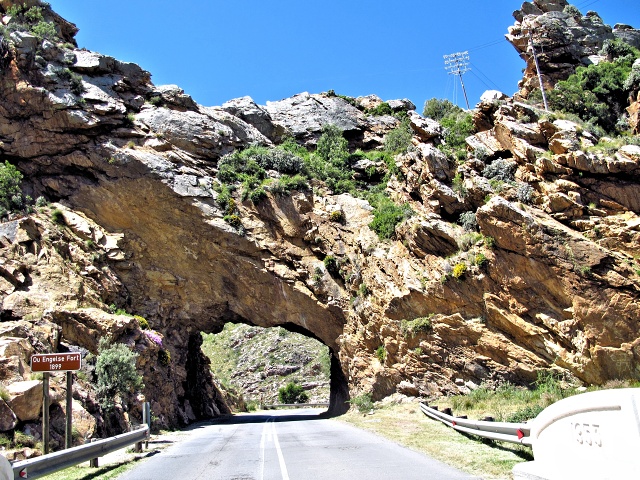
[Kogmanskloof Pass] The remains of an old English fort from 1899
Get sozzled
Although local billboards were not thus straightforward, at any moment I would encounter a signpost for a vineyard beside the road. The largest South African wine-growing region is in the vicinity of Robertson. There are currently 48 vineyards and all, without exception, offer free tasting. I was there at the wrong time – I arrived in Robertson on a Saturday afternoon and tastings were limited on Saturdays. And usually no tasting was offered on Sundays. But as mentioned, I did not intend to drink wine when cycling, as I wanted to survive the local, sometimes quite wild, traffic.

[Tradouw Highlands] One of the many billboards along the road, inviting the visitor to local wine-tasting
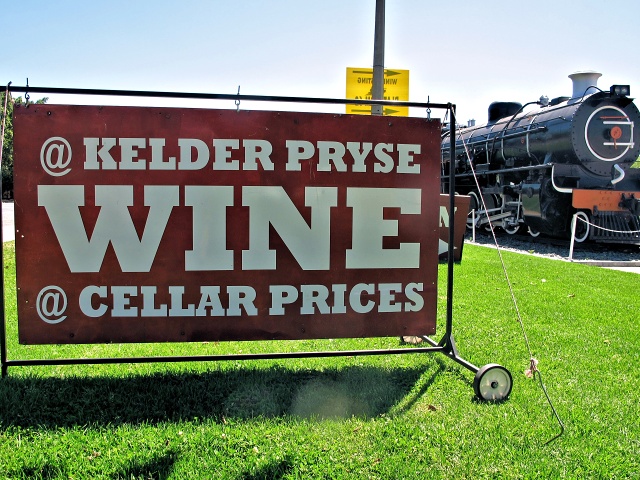
[Ashton] The sign in the center of Ashton advertises wine prices as from the cellar
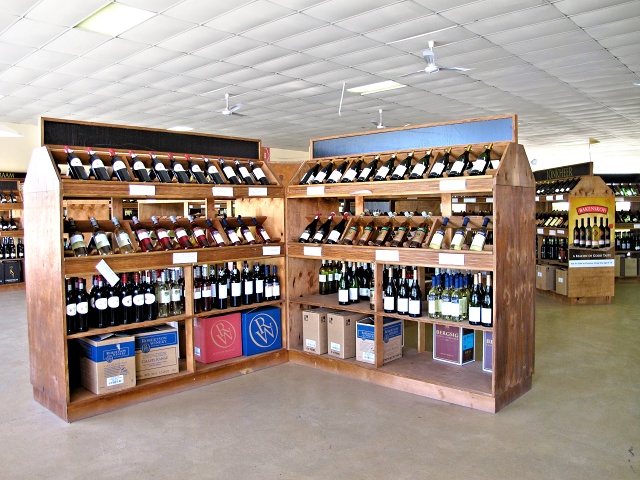
[Ashton] Wine store and tasting
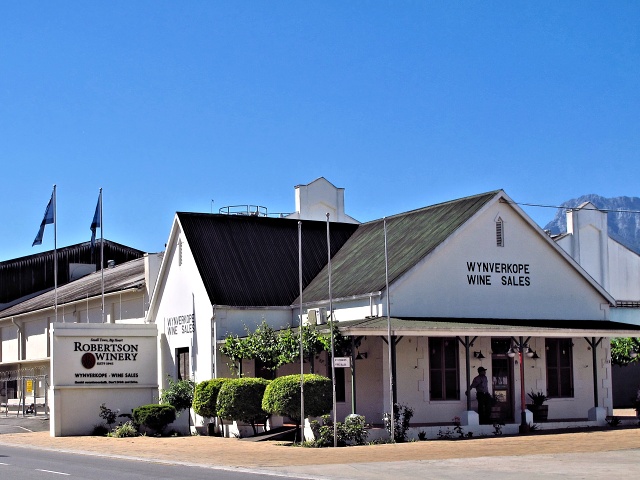
[Robertson] Robertson winery – rather factory – I buy regularly from them
Robertson
A GPS led me to Robertson Backpackers, located on the edge of the fairly large town. I pitched my tent on the lush lawn in the garden. It was already quite hot there and I had arrived covered in salt from the dried sweat after the hills, so washing was a necessity. I left the bags next to the tent and cycled 2km to buy food at the SuperSPAR. Traditionally, I bought broiled fish, a pile of cooked vegetables, cheese, yogurt and also vegetables for the morning. I was not drinking beer right then, it seemed like an insult to the local wine-growing region. I stylishly drank Shiraz from the local Robertson Winery – cheap, treacherously good wine (of course red) with a distinctive flavor.
Wiser Retreats
I wanted to reach Tulbagh more than 100 km away. This was the right dosage and, even in the local hot Spring weather, it did not cause me any problems. From the outset, it looked promising, although I cycled quite slowly, but it was uphill all the time. I enjoyed watching the baboons perched on a railway line running parallel to the road. When I reached the top, after a not very steep climb, there was a significant turn for the worse. A devastating wind blew against me and I struggled with it at a speed of 10 kph. It was clear to me that it was pointless to torment myself like this for another 60 km, so I stopped over in Worcester. After all, it was a Sunday and the law permits a rest on this day.

[30 km west of Robertson] Waiting for the train
Worcester
First I searched for a Caravan Park. I asked a policeman who confidently sent me to one end of the town. There was a swimming pool, but no camp. They sent me to the other end of the town, where there was a camp, but it was the private accommodation for workers of the building company that owned the plot. They would have let me stay there, but I did not like the look of it. I found an adequate guesthouse in the town, adequate for a sweaty and grubby bum, where nobody objected to the bike being taken into the room.
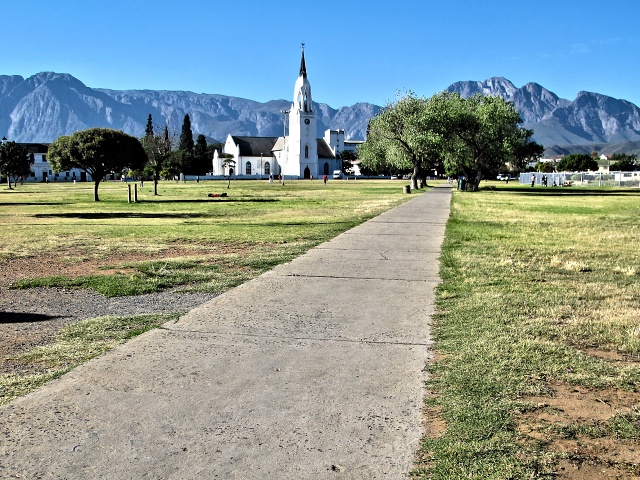
[Worcester] The main square
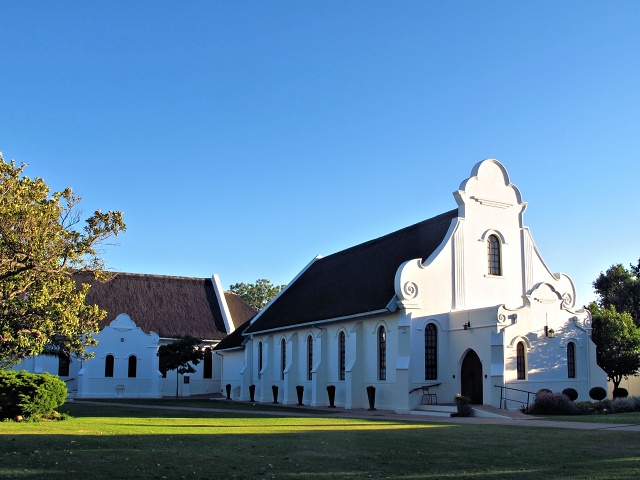
[Worcester] Presbyterian Church
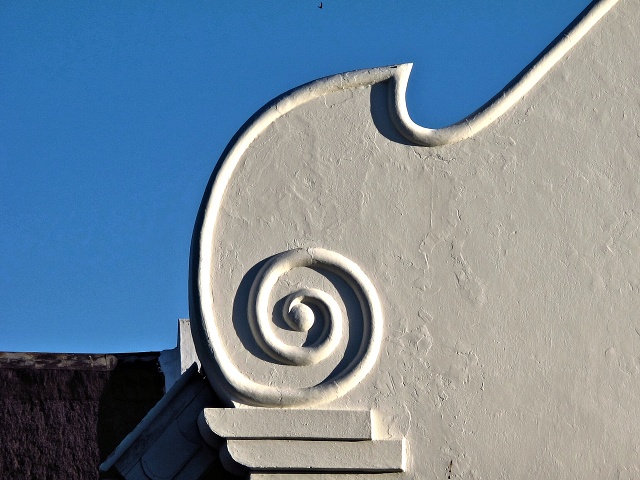
[Worcester] Detail on Presbyterian Church gable
Worcester is a pleasant town, that is, its central part around Church Street, where several clean-style churches of different faiths are concentrated, mostly Protestant, introduced by the Dutch and the English there. And let’s not forget the French Huguenots, who after the Night of St. Bartholomew, also found refuge in this area. It was a Sunday, so the big supermarkets were already closed, but lots of small stores were open, mostly owned by Indians or Pakistanis. In the center, there is a large grassy square, rather a park, where plenty of less affluent residents were lying around, drinking beer or something stronger and smoking intensely from the water pipes that are popular there. The local Asian community, former citizens of the Commonwealth, was playing cricket in the park. Everything was fine until it started to get dark. I wanted to go out for a meal, but the guesthouse owner warned me that it was very dangerous. The restaurant was only a few blocks from the guesthouse, so I took a pepper spray in case of emergency, ate well and arrived back at the guesthouse without a problem. A few girls of loose morals shouted at me and one desperate man even pulled me by the sleeve, but I ignored them, so no conflicts occurred.
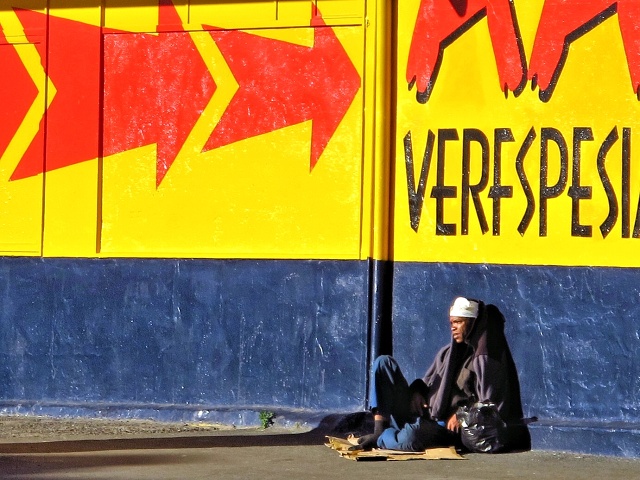
[Worcester] A normal sight—a hobo in the center
The Early Bird Catches the Worm
I was worried that the gale of the previous day would be repeated. I got up early and at 7.30 a.m. was already spinning the pedals. It was a bit windy, but more or less blowing from behind. The unusual wind brought about a change in the weather, it started to rain at about 10 a.m. The rain lasted only for 15 minutes, I did not even put on the Gore-Tex. Extensive road repairs started 10 km after Worcester. The narrow road was being widened to add wider verges, so the road was really very narrow. I carefully watched out for trucks and always stopped, just teetering on the edge of the narrow road. Again, there were several stupid male drivers, including two females, who overtook, coming towards me, without wondering how I would get out of the road without being knocked down. This fun lasted until the 35th kilometer, then there were several kilometers of the new road which did not have any marked lanes or verges yet.
Tulbagh
I visited Tulbagh, I wanted to see the beautiful, more than 150-year-old houses in Church Street. They were amazing. The houses are white-washed, with contrasting black thatched roofs and dark green painted shutters. I stopped first at the Information Center, to be equipped with maps, descriptions and verbal instructions from a very competent lady. She then forced me to pose with the bike for a photo supposedly for the Municipal Chronicle. As one of the few visitors there, I bought a (very cheap) ticket to the Museum which entitled a visit to three different expositions in various houses and the Folk Museum in the Old Church (Oude Kerk Volksmuseum, in Afrikaans). The first museum thoroughly documented the individual houses, plans and floor plans, lists of owners and services that were, and possibly still are, provided in them. The main attraction in the Church was the Symphonium which played very clearly for five minutes after being wound up, only the creaking of the unlubricated shaft disturbing the impression slightly. I offered to the Guide of miniature stature that I would bring some oil and lubricate the machine, but my offer was not accepted. If you are nearby, definitely visit Tulbagh.

[Tulbagh] The facade of the Old Church – Oude Kerk

[Tulbagh] Oude Kerk
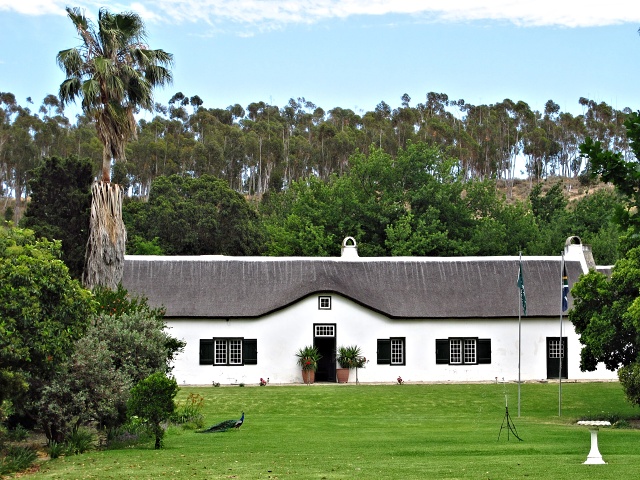
[Tulbagh] Reader's Restaurant in Church Street
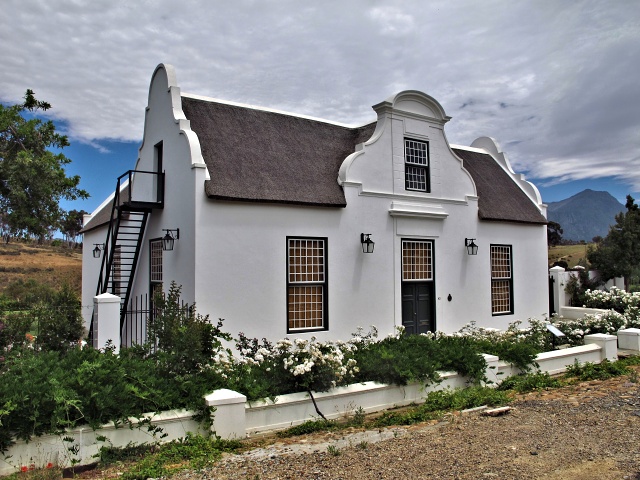
[Tulbagh] Het Land van Waveren is a neat house at the end of Church Street

[5 km west of Tulbagh] I liked the landscape
Ad hoc is a Good Method
I was heading towards the Atlantic Ocean, with a choice of several routes. Originally I wanted to go via Malmesbury, a big town, at least according to the size of the dot on the map, where it would not have been a problem to find accommodation. However, the road turned towards the south, noticeably against the wind. The road branched off to the north-west to Road 44 which I could also take to reach the Atlantic. And so I pondered for a moment, but then decided to go in the direction of Gouda, Porterville and Piketberg. The fresh wind, almost from behind, supported my decision with the right arguments. By the time I reached Porterville, I had covered 110 km, the daily average was fulfilled, comrades. So I stopped at the Information Center, let them recommend a cheap and quality accommodation, thus ending another day of my journey.
I underestimated the caloric richness of the morning breakfast and so I suffered somewhat on the 27-km road to Piketberg. To force my stomach to digest the breakfast completely, out of diligence I cycled up to the church on the hill in Piketberg, even though it was not necessary, as the church was not worth a photo to me. The route to the Atlantic was tedious, still the same Karoo (semi-desert) landscape, slightly undulating. The road beyond Wittewater was bustling with police cars, at least ten overtook me. One of them was a big black police SUV, the kind of which I had never seen before. The road was blocked by striking farm workers, the strike had lasted for several days already. I had been alerted about it already in Porterville. The policemen made a narrow passage for me among the striking mass. The strikers, instead of throwing stones, waved at me. I, like a fool, began to wave my hand, like Husák in acknowledgment on the 1st May, and I was rewarded with spontaneous applause. Luckily, the cops did not apply their batons to me, instead they smiled broadly.
I pedaled hard for another 50 km. My mind was wandering God knows where, when suddenly the unmistakable smell of the sea penetrated my nostrils. I knew it was the end of that day’s cycling, as well as of this chapter in my travel diary.







|






































